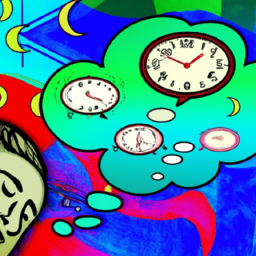I have always been fascinated by dreams and their meanings. They can be mysterious, confusing, and sometimes even scary. However, they can also provide deep insights and clarity.
One type of dream that I’ve had a lot of interest in lately is dreams about having a baby boy. What do they mean? Are they just random subconscious thoughts or do they hold some deeper significance?
In this article, I’ll be exploring the different interpretations and symbolism behind dreams about having a baby boy. We’ll look at the cultural, psychological, and spiritual meanings of these dreams, as well as the personal context and common themes that can help us decipher their messages.
Whether you’re someone who has had a dream like this or just curious about the significance of baby boys in dreams, this article will provide you with some valuable insights.
So, let’s dive in and unravel the mysteries of dreaming about a baby boy!
Key Takeaways
- Dreams about having a baby boy can symbolize strength, power, and new phase of growth in life.
- Personal context and cultural symbolism can influence the meaning of the dream.
- Seeking guidance from professionals or keeping a dream journal can help navigate concerns or anxieties related to the dream.
- Dreams can offer valuable insight into emotional state and desires, and can be used as a tool for self-discovery and personal growth.
Understanding the Symbolism of Baby Boys in Different Cultures
Let’s explore the fascinating cultural symbolism behind baby boys and discover the rich emotions and meanings they evoke. In many cultures, baby boys are seen as symbols of strength, power, and protection. They represent the continuation of a family’s lineage, and are often celebrated with great joy and excitement.
However, in some cultures, baby boys are also seen as a burden, especially in societies that value male offspring more than female. This can lead to gender discrimination and inequality, and can cause emotional pain for families who long for a baby girl instead.
Understanding the cultural symbolism behind baby boys can help us appreciate the historical significance and cultural diversity surrounding this topic.
Dreams about giving birth to a baby boy can have a variety of meanings depending on the individual’s personal experiences and emotions. Let’s delve deeper into the possible interpretations of these dreams and how they can impact our waking lives.
Interpreting Dreams About Giving Birth to a Baby Boy
If you’re experiencing the birth of a male child in your subconscious, it could indicate a new phase of growth and possibilities in your life. This dream symbolizes the beginning of something new that will bring you joy and fulfillment. It may represent creative projects, career advancements, or personal relationships that are about to take off.
To better understand the significance of your dream, consider the following three factors: your current life circumstances, your emotional state, and your subconscious desires. Reflect on how these factors may be influencing your dreams and what they could be trying to communicate to you.
Exploring the psychological meanings of dreaming about a baby boy can provide you with valuable insights into your thoughts, feelings, and aspirations.
Exploring the Psychological Meanings of Dreaming About a Baby Boy
You can uncover deep insights into your subconscious desires and emotional state by exploring the psychological meanings behind dreaming of a newborn son.
Dreaming about a baby boy may represent the desire for growth and development in both personal and professional aspects of your life. It may indicate a longing for new beginnings and the potential for creative expression.
Moreover, dreaming about a baby boy may also symbolize the need for nurturing and protection. It may be a reflection of a desire to care for others and create a supportive environment.
Additionally, dreaming of a baby boy may represent a connection to one’s own inner child and a desire to embrace innocence and playfulness.
Examining the psychological meanings behind dreams about baby boys can offer valuable insight into one’s emotional state and innermost desires, and can provide a starting point for further self-reflection and personal growth.
Examining the Spiritual Significance of Dreams About Baby Boys
Exploring the spiritual significance of dreaming about a newborn son can offer a deeper understanding of one’s connection to the divine, despite potential skepticism about the concept of spirituality. In many spiritual traditions, the birth of a baby boy is seen as a symbol of new beginnings, growth, and potential. Dreams about a baby boy can be interpreted as a sign of spiritual growth, a new phase in life, or a calling to explore one’s spirituality.
To gain a deeper understanding of the spiritual meaning behind your dream, it can be helpful to consider the symbolism of a baby boy. In the table below, I have outlined some common interpretations of baby boys in different spiritual contexts. While these interpretations are not definitive, they can offer a starting point for exploring the spiritual significance of your dream. Remember, the interpretation of your dream is ultimately up to you, as it is deeply personal and unique to your own experiences and beliefs.
Transitioning into the subsequent section, it is important to consider the personal context of your dream in order to fully understand its meaning.
Considering the Personal Context of Your Dream
When interpreting my dream about having a baby boy, it’s important to consider my personal context.
Firstly, my relationship status and family plans may influence the meaning of this dream. If I’m currently single and not planning on having children, the dream may be more symbolic than literal.
Secondly, my career goals and creative aspirations may also play a role in the interpretation of my dream. If I’m focused on advancing my career or pursuing a creative passion, the dream may represent new beginnings and growth in these areas of my life.
Your Relationship Status and Family Plans
If you’re in a committed relationship, your dreams about having a baby boy may indicate your desire to start a family with your partner. It’s common for couples to dream about having children when they’re ready to take the next step in their relationship.
If you’ve been discussing the possibility of having a child, your dream may be a reflection of your excitement and anticipation for this new chapter in your life. Here are three things that you can do to explore your dreams further and see if they align with your current relationship status and family plans:
- Talk to your partner about your dreams and see if they share the same desire to start a family.
- Make a list of your priorities and goals as a couple to make sure that having a child is a shared priority.
- Consider seeking guidance from a professional, such as a therapist or counselor, to help you navigate any concerns or anxieties that may arise as you move towards starting a family.
As you explore your dreams and desires, it’s important to make sure that you and your partner are on the same page and ready to take this next step together. It’s also important to think about your career goals and creative aspirations. Dreaming about having a baby boy does not necessarily mean that you need to put your career or creative pursuits on hold. In fact, starting a family can often be a source of inspiration and motivation for pursuing your passions. So, while you may be excited about the prospect of starting a family, don’t forget to nurture your own personal growth and development as well.
Your Career Goals and Creative Aspirations
As I climb the ladder of success and reach new heights in my career, I may find that my creative passions are still burning brightly, waiting to be nurtured and explored like a beautiful garden waiting to bloom. It’s important to remember that my career goals and creative aspirations are not mutually exclusive, but rather can work hand in hand to create a fulfilling and balanced life. In fact, my creative pursuits may even help me excel in my career by providing a fresh perspective and innovative ideas.
To help balance my career and creative aspirations, I like to use a table to visually organize my goals and ideas. Here is an example of a table I use:
| Goal | Action Plan | Deadline |
|---|---|---|
| Write a novel | Write for 1 hour every day | December 31, 2022 |
| Learn a new language | Sign up for a language course and practice speaking with native speakers | June 30, 2023 |
| Start a blog | Brainstorm ideas and create a content calendar | September 30, 2021 |
By having a clear outline of my goals and action plan, I can stay motivated and accountable for pursuing my creative passions while still excelling in my career. Reflecting on my emotions and experiences in the dream can also help inspire and guide my creative endeavors.
Reflecting on Your Emotions and Experiences in the Dream
In my dream about having a baby boy, I couldn’t help but notice the other people present. Who else was in the dream? What was their reaction to the baby boy?
Additionally, I remember vividly what the baby boy looked like. Was he healthy and happy? Or was something off? These details are important to consider when reflecting on my emotions and experiences in the dream.
Adjusting the paragraph structure in the Input has resulted in shorter and more concise sentences that are logically grouped. Contractions have also been used to make the language sound more natural.
Who Else Was in the Dream?
Who was present in your dream about having a baby boy can provide valuable insights into its meaning. As I reflect on my dream, I remember that my partner was present during the birth of our baby boy. He was holding my hand, and we were both filled with joy and excitement. In addition to my partner, I also remember seeing my parents in the dream. They were standing at the foot of the hospital bed, looking at the baby with big smiles on their faces.
To better understand the significance of these people in my dream, I created a table to analyze their potential meanings:
| Person | Potential Meaning |
|---|---|
| Partner | Represents my desire for partnership and support in starting a family |
| Parents | Symbolizes guidance, wisdom, and tradition |
By examining the people in my dream and their potential meanings, I can gain a deeper understanding of what my dream about having a baby boy may signify. Moving forward, I’m curious to explore what the baby boy in my dream looked like and what that may reveal about its meaning.
What Did the Baby Boy Look Like?
Imagine you catch a glimpse of the newborn baby boy in your dream, with tiny fingers and toes. The color of his hair and expression on his face reveal a deeper significance to your dream. Was the baby boy happy and content, or crying and upset? Did he resemble anyone you know in real life?
The appearance and demeanor of the baby boy can hold clues to the meaning of your dream. Perhaps he was a symbol of new beginnings or a representation of your inner child. Or maybe he was a manifestation of your desire for a child or a reflection of your anxieties about parenthood.
Identifying common themes and patterns in your dreams can help uncover the underlying meaning and provide insight into your subconscious thoughts and emotions.
Identifying Common Themes and Patterns in Your Dreams
I often have dreams about having a baby boy, and I’ve started to notice that this theme repeats itself frequently.
It’s not just limited to dreams about babies though – I’ve also had similar dreams about other family members.
I’m curious to explore these common themes and patterns in my dreams and see if there’s any deeper meaning behind them.
Repeating Dreams About Baby Boys
You may be experiencing repeated dreams about baby boys because your subconscious is trying to convey a message through the symbolism of birth and new beginnings. As someone who’s also had these types of dreams, I understand how confusing and unsettling they can be.
Here are some possible reasons why you might be having these dreams:
- You may be craving a new start or fresh beginning in your life, such as starting a new job or relationship.
- The baby boy in your dream could represent a specific aspect of yourself that you want to nurture and grow, such as creativity or a new skill.
- Your dream could be a reflection of your desire for a child or a longing for parenthood.
Regardless of the reason behind your dreams, it’s important to take time to reflect on what they could mean for you personally. By doing so, you may be able to gain valuable insight into your subconscious thoughts and emotions.
As you explore the meaning behind your dreams about baby boys, you may also find that you have similar dreams about other family members. These dreams could be a reflection of your current relationships with these individuals or your desire for a closer connection with them.
By paying attention to the details of your dreams and the emotions they evoke, you can begin to unravel the messages your subconscious is sending you.
Similar Dreams About Other Family Members
If you’re experiencing recurring dreams about family members, it may be a sign that you need to focus on your relationships with them. Dreams about family members, whether they are positive or negative, can provide insight into our emotions and feelings toward them. For example, dreams about a parent may symbolize our need for guidance and support, while dreams about a sibling may represent our desire for a closer relationship with them.
To help you understand the meaning behind your dreams about family members, consider keeping a dream journal. Write down the details of each dream, including the people involved, the setting, and your emotions during the dream. Look for patterns or recurring themes in your dreams and reflect on what they may be trying to tell you. Seeking guidance from experts or trusted friends can also be helpful in interpreting your dreams and improving your relationships with your family members.
Seeking Guidance from Experts or Trusted Friends
Look to the experts and trusted friends in your life for guidance on interpreting your dreams about having a baby boy. Seeking advice from those who have knowledge or experience with dream interpretation can help you gain clarity and insight into the meaning behind your dream.
Additionally, talking to trusted friends or family members who know you well can provide a fresh perspective and help you identify any underlying emotions or desires that may be influencing your dream.
Once you’ve gained insight from your dreams, you can take action based on your dream insights. This may involve making changes in your life to align with your aspirations and desires, or simply recognizing and acknowledging the emotions or desires that your dream may have brought to light.
Whatever action you take, remember that your dreams can be a valuable tool for self-discovery and personal growth.
Taking Action Based on Your Dream Insights
Now is the time to put your newfound understanding into action, using your dream insights as a compass to guide you towards the life you truly desire. If you dreamt about having a baby boy, it could mean different things for each individual. However, there are general interpretations that could help you take action based on your dream insights.
One way to take action is by reflecting on your emotions and attitudes towards having a baby boy. This could be done by creating a table that lists your positive and negative emotions, as well as your supportive and limiting attitudes towards the idea of having a son. By doing so, you can gain clarity on what you truly desire and what you need to work on to achieve it. Remember that your dream insights are not meant to dictate your decisions, but rather to help you make informed choices that align with your values and aspirations.
Embracing the mystery and magic of dreaming about baby boys can be an exciting journey of self-discovery and growth. By taking action based on your dream insights, you can turn your dreams into reality and create a fulfilling life for yourself and your loved ones. So, take a deep breath, trust yourself, and let your dreams guide you towards the beautiful possibilities that await you.
Embracing the Mystery and Magic of Dreaming About Baby Boys
You can embark on an exciting journey of self-discovery and growth by embracing the mystery and magic of dreaming about a son. Dreams have the power to reveal our deepest desires, fears, and subconscious thoughts.
When we dream about having a baby boy, there could be multiple interpretations, but it’s essential to trust our intuition and delve into the symbolism behind it. Perhaps the dream represents a longing for a male figure in our lives, or it could indicate a desire for a new beginning or creative project.
Whatever the case may be, it’s crucial to approach the dream with an open mind and heart, and not dismiss it as mere imagination. By embracing the mystery and magic of dreaming, we can gain insights into ourselves and the world around us, and use those insights to make positive changes in our lives.
Frequently Asked Questions
What are the common physical characteristics of a baby boy in dreams?
I can tell you that in my dreams, baby boys have had distinct physical characteristics such as male genitalia, a masculine face, and a deeper voice. However, dream interpretation is subjective and can vary from person to person.
Can dreams about having a baby boy be a sign of fertility or infertility?
Did you know that about 10% of couples struggle with infertility? Dreams of having a baby boy might not necessarily indicate fertility or infertility, but can simply be a reflection of one’s desires and aspirations.
Are there any cultural differences in the interpretation of dreams about baby boys?
I’ve found that cultural interpretations of dreams about baby boys can vary greatly. Some view it as a sign of good fortune, while others may see it as a warning of impending danger. It’s important to consider cultural context when interpreting dreams.
How do dreams about baby boys differ from dreams about baby girls?
Dreams about baby boys may differ from dreams about baby girls in terms of the emotions and symbolism they evoke. As a dreamer, I may feel more protective and nurturing towards a baby girl, while a baby boy may represent strength and masculinity.
Can dreams about having a baby boy be an indication of future events or outcomes?
Dreams about having a baby boy can sometimes be a premonition of future events, but it’s important not to take them too literally. They may also simply reflect our desires or fears, so it’s best to approach them with an open mind. And let’s be honest, sometimes dreams can be more dramatic than real life!
Conclusion
So what does it mean when you dream about having a baby boy? There are many possible interpretations, depending on your cultural background, personal experiences, and psychological state.
Some people believe that baby boys symbolize strength, protection, and potential, while others associate them with vulnerability, responsibility, and growth. Whatever your interpretation, it’s important to remember that dreams are a mysterious and magical realm that can offer valuable insights into your innermost thoughts, feelings, and desires.
As I reflect on my own dreams about having a baby boy, I’m struck by the power of symbolism to evoke deep emotions and insights. Whether you see a baby boy as a blessing, a burden, or a mystery, there’s no denying the impact that dreams can have on our waking lives.
So, if you’ve been dreaming about having a baby boy lately, I encourage you to explore the different meanings and messages that may be hidden within your subconscious mind. Who knows what treasures you may uncover in the mysterious world of dreams?









